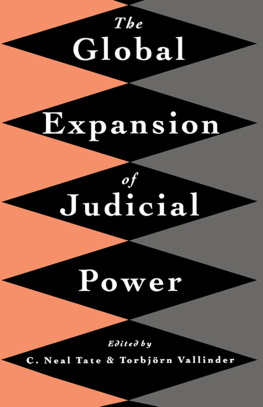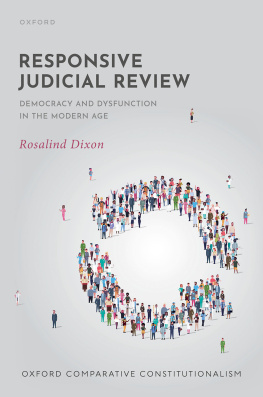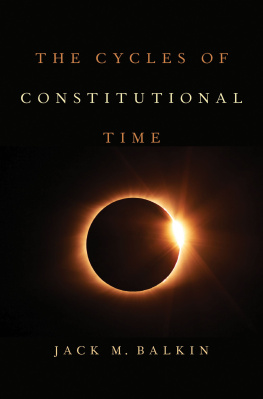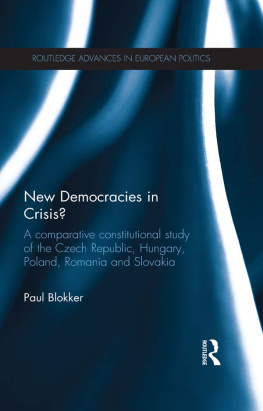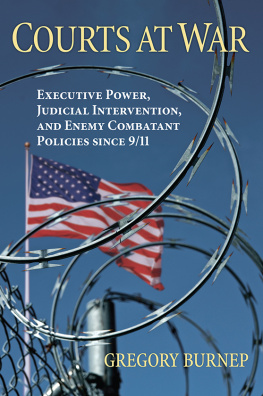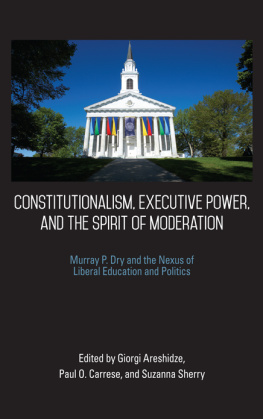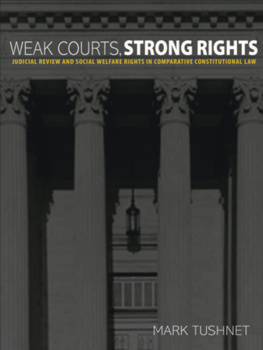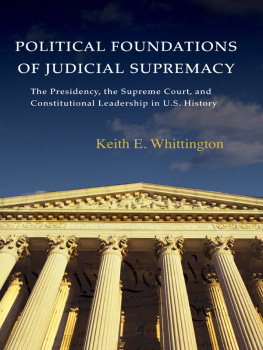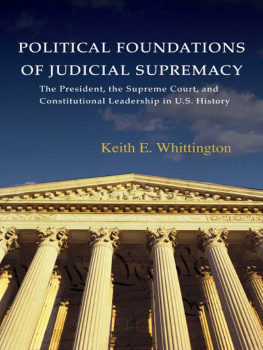Thank you for buying this ebook, published by NYU Press.
Sign up for our e-newsletters to receive information about forthcoming books, special discounts, and more!
Sign Up!
About NYU Press
A publisher of original scholarship since its founding in 1916, New York University Press Produces more than 100 new books each year, with a backlist of 3,000 titles in print. Working across the humanities and social sciences, NYU Press has award-winning lists in sociology, law, cultural and American studies, religion, American history, anthropology, politics, criminology, media and communication, literary studies, and psychology.
THE GLOBAL EXPANSION OF JUDICIAL POWER
Major support for the publication of this work has been generously provided by the Italian National Research Council (CNR) and the Foundation SER.IN.AR of Forl.
THE GLOBAL EXPANSION OF JUDICIAL POWER
Edited by
C. Neal Tate
and
Torbjrn Vallinder
NEW YORK UNIVERSITY PRESS
New York and London
1995 by New York University
All rights reserved
Library of Congress Cataloging-in-Publication Data
The global expansion of judicial power / edited by C. Neal Tate and
Torbjrn Vallinder.
p. cm.
Some papers were originally presented at the theme meeting
Judicialization of Politics, hosted by the Centro studi
sullordinamento giudiziario, Bologna, University of Bologna, Forl,
Italy, June 1992.
Includes bibliographical references and index.
ISBN 0-8147-8209-4 (alk. paper)
1. Judicial power. 2. Judicial review of administrative acts.
3. Judicial process. I. Tate, C. Neal (Chester Neal), 1943
II. Vallinder, Torbjrn.
K3367.G58 1995
347.012 dc20
[342.712] 95-11510
CIP
New York University Press Books are printed on acid-free paper,
and their binding materials are chosen for strength and durability.
Manufactured in the United States of America
10 9 8 7 6 5 4 3 2 1
To Chester and Pearl Tate
for the values
and to Carol and Erin
for the inspiration.
To Ulla and Per Anders,
companions
before, in, and after Forl.
Acknowledgments
Most of the chapters included in this volume were originally presented as papers to the theme meeting The Judicialization of Politics of the Research Committee on Comparative Judicial Studies of the International Political Science Association. This meeting was graciously hosted by the Centro Studi sullOrdinamento Giudiziario of Bologna at the University of Bolognas campus in Forl, Italy, in June 1992. The dedicated work of the staff of the Centro, especially its founding director, Giuseppe Di Federico, and the principal meeting organizers, Carlo Guarnieri and Patrizia Pederzoli, made the Forl meeting not just productive, but positively enjoyable for all who attended. The editors and contributors thank these fine colleaguesand all the others who contributed to making the meeting so successful. It is an understatement to say that without them neither the meeting nor this book would have been possible.
Major funding support for the Forl meeting, as well as for the publication of this work, was generously provided by the Italian National Research Council (CNR) and the Foundation SER.IN.AR of Forl. Additional support was provided by the Institute of Public and International Affairs of the University of North Texas.
Subsequent to the Forl meeting, several of the chapters in this work appeared in somewhat to substantially different forms in a symposium issue of the International Political Science Review edited by Torbjrn Vallinder (vol. 15, no. 2, April 1994). The relevant chapters include those by Martin Edelman, Christine Landfried, Barry Holmstrm, Peter H. Russell, Martin Shapiro, Maurice Sunkin, C. Neal Tate (appeared in somewhat different form in the South African Journal on Human Rights (November 1993), portions of the chapter by Alec Stone appeared in Comparative Political Studies (26, no. 4, January 1994, pp. 443-69), and portions of the chapter by W. A. Bogart appear in his Courts and Country: The Limits of Litigation and the Social and Political Life of Canada (Toronto: Oxford University Press, 1994).
Contents
C. Neal Tate and Torbjrn Vallinder
Torbjrn Vallinder
C. Neal Tate
Martin Shapiro
Maurice Sunkin
Brian Galligan and David R. Slater
John Power
W. A. Bogart
Peter H. Russell
Anna Mestitz and Patrizia Pederzoli
Francesca Zannotti
Alec Stone
Giuseppe Di Federico
Carlo Guarnieri
Michael Mandel
Jacqueline Lucienne Lafon
Christine Landfried
H. G. Peter Wallach
Barry Holmstrm
Jan ten Kate and Peter J. van Koppen
Carmel A. Agius and Nancy A. Grosselfinger
Martin Edelman
Cheryl A. Thomas
William Kitchin
C. Neal Tate
Nico Steytler
C. Neal Tate and Torbjrn Vallinder
THE GLOBAL EXPANSION OF JUDICIAL POWER
1.
The Global Expansion of Judicial Power:
The Judicialization of Politics
C. NEAL TATE AND TORBJRN VALLINDER
THE EXPANSION OF JUDICIAL POWER
Bob Bullock, the lieutenant governor of Texas, plaintively appealed to a television newscast audience in May 1993: We really need help. Im not a proud man. Ill accept suggestions from anybody, because we really need help! What was the cause of Bullocks distress? As presiding officer of the Texas Senate, he was reacting to the overwhelming rejection by the states voters of a so-called Robin Hood constitutional amendment state leaders had devised to equalize funding of the states school districts. The amendment was the latest effort of the legislative and executive branches of the Texas government to solve a school funding crisis that had plagued them for four years. The rejection of the amendment meant that the legislature now faced the task of coming up with yet another solution to the funding dilemmawithin one month, if they wished to avoid a promised cutoff of state funding and possible shutdown of the states public schools. Whence came the dilemma and the deadline? From a state district judge who was implementing a decision of the Texas Supreme Court that had declared the system of funding public education to be in conflict with the requirements of the states own constitution.
It has not been very common in Texas for state judges to cast the leaders of elected governmental institutions onto the horns of such a policy dilemma. The same cannot be said for federal judges. Indeed, a single federal district judge, William Wayne Justice, is famous/notorious for his decisions requiring Texas to reshape its policies regarding public education, mental health, juvenile justice, prisons, and other areas (see Kemerer 1991). The experience of Texas is far from unique. Virtually every American state has been, in recent years, under a variety of mandates from its own courts or those of the national government to revise its policies governing the provision and funding of basic state services of one kind or another.

